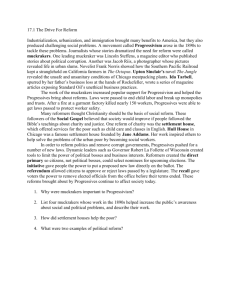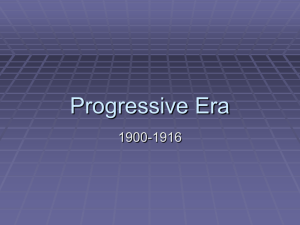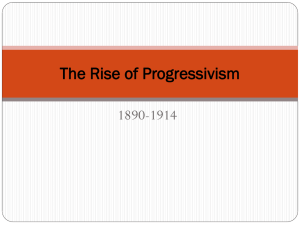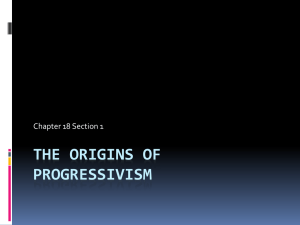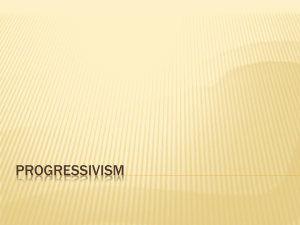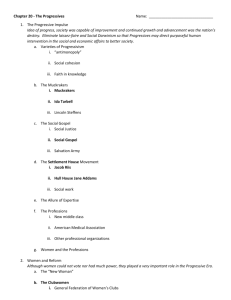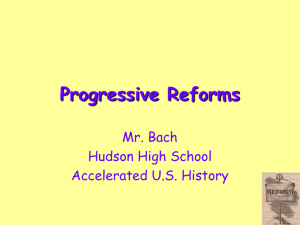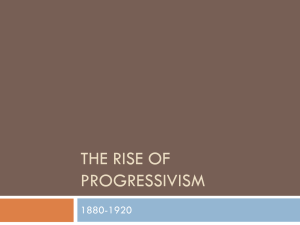The Progressive Era (1890-1920) This chapter is meant to focus on…
advertisement
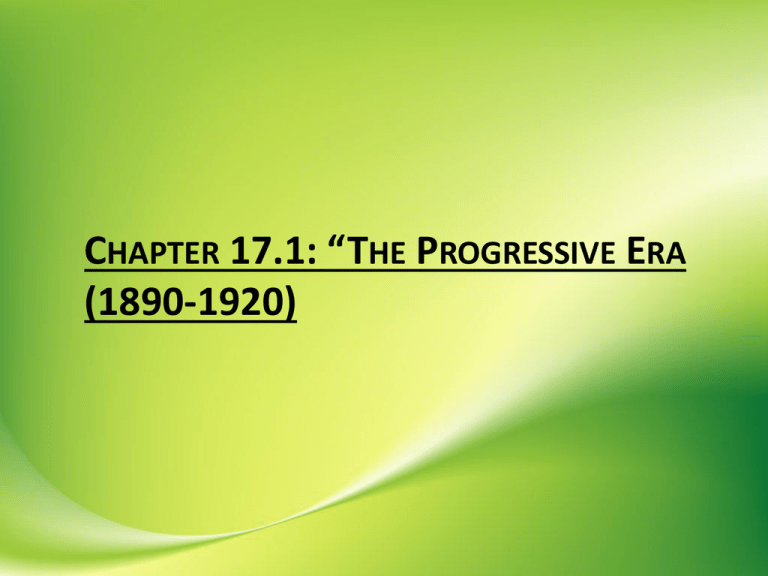
CHAPTER 17.1: “THE PROGRESSIVE ERA (1890-1920) This chapter is meant to focus on… • Identifying the causes of Progressivism and compare it to Popularism. • Evaluate some of the social reforms that Progressives tackled. • Explain what Progressives hoped to achieve through political reforms. Progressives Share Common Beliefs Most Progressives believed that… • Industrialization and Urbanization caused trouble for social problems and political problems. Their solution? • Reforms. ***Progressivism was similar to the Populist Movement. • Both wanted to use Reform to get rid of government corruption. • Both wanted to stop the abuses of Big Business. ***Progressivism differed from the Populist Movement by: • Progressives wanted highly educated persons to use logic and reasons. • Most Progressives were from the Middle Class. • The Populists were usually working class laborers and farmers. Progressives Target a Variety of Problems • ***Progressives had different priorities and debated which reform was most important… • Women demanded the right to vote. • Others wanted Political reform to destroy gov’t corruption. • Their targets being local criminal networks called, Political Machines. • Political Machines used bribery and violence to influence voters and win elections. American Cities became a huge problem for the average person. Most cities ran into several problems… No proper paved roads No safe clean water Often overcrowded No decent housing. These issues often led to poor and wretched living conditions. Muckrakers Reveal the Need for Reform ***Muckrakers were socially conscious journalist. • President Theodore Roosevelt who believed that the writers were too fascinated with the ugliest side of things gave the name to them. The Public became horrified at the truths and stories the Muckrakers shared exposing the conditions in the city. Famous Muckrakers Lincoln Steffens Published: “The Shame of the Cities” He exposed the corruption in Philadelphia’s utility companies and local government. Jacob Riis Photographer He took pictures of over-crowded, unsafe, and rat-infested tenement buildings. Novelists Defend the Downtrodden Fiction Writers put a human face on social problems… • ***They created a new genre called, “The Naturalist Novel” • ***This portrayed human misery and the struggles of the common people. Upton Sinclaire: “The Jungle” There was meat that was taken out of pickle and would often be found sour, and they would rub it up with soda to take away the smell, and sell it to be eaten on free-lunch counters; also of all the miracles of chemistry which they performed, giving to any sort of meat, fresh or salted, whole or chopped, any color and any flavor and any odor they chose. There was never the least attention paid to what was cut up for sausage; there would come all the way back from Europe old sausage that had been rejected, and that was moldy and white – it would be dosed with borax and glycerin, and dumped into the hoppers, and made over again for home consumption. There would be meat that had tumbled out on the floor, in the dirt and sawdust, where the workers had tramped and spit uncounted billions of consumption germs. There would be meat stored in great piles in rooms; and the water from leaky roofs would drip over it, and thousands of rats would race about on it. It was too dark in these storage places to see well, but a man could run his hand over these piles of meat and sweep off handfuls of the dried dung of rats. These rats were nuisances, and the packers would put poisoned bread out for them; they would die, and then rats, bread, and meat would go into the hoppers together. There were those who worked in the chilling rooms, and whose special disease was rheumatism; the time limit that a man could work in the chilling rooms was said to be five years. There were the wool-pluckers, whose hands went to pieces even sooner than the hands of the pickle men; for the pelts of the sheep had to be painted with acid to loosen the wool, and then the pluckers had to pull out this wool with their bare hands, till the acid had eaten their fingers off. There were those who made the tins for the canned meat; and their hands, too, were a maze of cuts, and each cut represented a chance for blood poisoning. The Social Gospel Guides Reform Efforts • Walter Rauschenbusch • A German Immigrant • ***Coined the phrase “Social Gospel” • ***This was his ideal of following the Bible and be devoted to charity and Justice. • He believed people were capable of “building the Kingdom of God.” • He pushed for an end of Child Labor, A shorter workweek, and the Federal Gov’t to put an end to Trusts. Protecting Children and Improving Education **But there were debates over what children should and shouldn’t learn in school. 1. Some argued that they should be taught only work skills. 2. Others said they should learn to appreciate literature and music. 3. Most believed boys and girls should be educated differently. John Dewey: Criticized American schools for teaching children facts rather than teaching them to think actively and critically. Progressives Help Industrial Workers ***Workers were often faced with… 1. Long hours 2. Poor ventilation 3. Hazardous fumes 4. Unsafe machinery The Triangle Shirtwaist Factory • Fabric caught fire and spread through the factory and the workers (women) had little chance of escaping. But the managers had locked the exits because there had been a problem with stealing. • Many jumped from the windows in desperation. Others were burned alive. Progressives were outraged by the Triangle Shirtwaist Company fire and pushed for reform in the labor force. ***Lochner v. New York The state of New York enacted a statute forbidding bakers to work more than 60 hours a week or 10 hours a day. ***The majority (through Peckham) maintained that the statute interfered with the freedom of contract, and thus the Fourteenth Amendment's right to liberty afforded to employer and employee. Progressives realized that they needed to reform the political process in order to reform society. ***direct Primary: An election in which citizens themselves vote to select nominees for upcoming elections. ***Initiative: Gave people the power to put a proposed new law directly on the ballot. ***Referendum: Allowed citizens to approve or reject laws passed by legislature. ***Recall: Gave voters the power to remove public servants from office before their term ended. 1.) What was the Triangle Shirtwaist Factory Fire? And What was the response from Progressives? 2.) Argue whether or not muckrakers had a right to expose the workings and labor conditions of private businesses?
